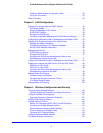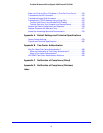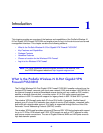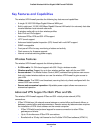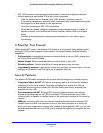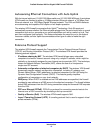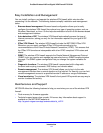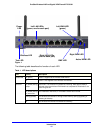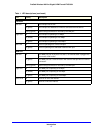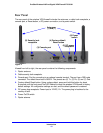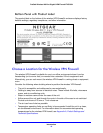
Introduction
12
ProSafe Wireless-N 8-Port Gigabit VPN Firewall FVS318N
• SSL VPN provides remote access for mobile users to selected corporate resources
without requiring a preinstalled VPN client on their computers.
- Uses the fa
miliar Secure Sockets Layer (SSL) protocol, commonly used for
e-commerce transactions, to provide client-free access with customizable user portals
and support for a wide variety of user repositories.
- Up to five simult
aneous SSL VPN connections.
- Allo
ws browser-based, platform-independent remote access through a number of
popular browsers, such as Microsoft Internet Explorer, Mozilla Firefox, and Apple
Safari.
- Provides granular access to
corporate resources based on user type or group
membership.
A Powerful, True Firewall
Unlike simple NAT routers, the wireless VPN firewall is a true firewall, using stateful packet
inspection (SPI) to defend against hacker attacks. Its firewall features have the following
capabilities:
• DoS protection. Automa
tically detects and thwarts denial of service (DoS) attacks such
as Ping of Death and SYN flood.
• Secure firewall. Blocks un
wanted traffic from the Internet to your LAN.
• Schedul
e policies. Permits scheduling of firewall policies by day and time.
• Logs security incident
s. Logs security events such as logins and secure logins. You can
configure the firewall to email the log to you at specified intervals.
Security Features
The wireless VPN firewall is equipped with several features designed to maintain security:
• Computers h
idden by NAT. NAT opens a temporary path to the Internet for requests
originating from the local network. Requests originating from outside the LAN are
discarded, preventing users outside the LAN from finding and directly accessing the
computers on the LAN.
• Port forwarding
with NAT. Although NAT prevents Internet locations from directly
accessing the computers on the LAN, the wireless VPN firewall allows you to direct
incoming traffic to specific computers based on the service port number of the incoming
request.
• DMZ po
rt. Incoming traffic from the Internet is usually discarded by the wireless VPN
firewall unless the traffic is a response to one of your local computers or a service for
which you have configured an inbound rule. Instead of discarding this traffic, you can use
the dedicated demilitarized zone (DMZ) port to forward the traffic to one computer on your
network.




